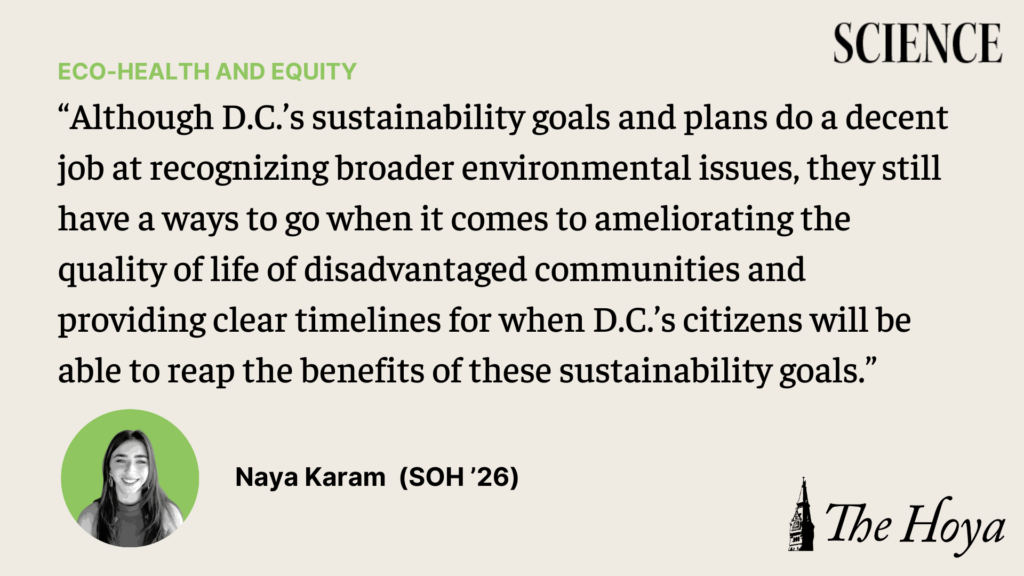Much fear surrounds the environmental crisis and its implications for the future of the community. Washington, D.C. residents are feeling the impacts of climate change, as more people are put at risk of smog-induced respiratory problems and heat-related illnesses such as West Nile virus. D.C.’s local government has taken notice of the issue, and while progress has been made regarding the adoption of sustainability efforts, there is much more to be done in order to combat and prevent further exacerbation of the issue.
The Department of Energy and Environment (DOEE) released a 2023 progress report in August, detailing the actions the government has taken to reach the goals set by Sustainable DC 2.0, Clean Energy DC and Climate Ready DC. Most of these goals are yet to be met, but the progress is beginning to translate into legislative action.
For example, Sustainable DC 2.0’s recently-launched Floodsmart Homes pilot program is beginning to install necessary flood-resilience upgrades in D.C. homes at risk of flooding, according to the progress report. Additionally, 17 million dollars have been allocated to initiatives supporting the development of infrastructure necessary for electric vehicle use, such as charging ports.
Sustainable DC 2.0 features goals that could help transform D.C. into a greener city, such as providing incentives for new building projects to achieve net-zero energy and replacing all street and public lighting with high efficiency fixtures that protect public health. Nonetheless, the mayor’s office has yet to address certain environmental health issues with the urgency and resources necessary for success.
Trash transfer stations, which are often placed in low-income communities, such as Brentwood, are polluting the areas, causing unbearable odors and and giving rise to pollutants that may cause asthma as well as lung and heart disease, yet no substantial course of action has been taken in order to combat this issue.
Additionally, overflowing sewage systems have contaminated the rivers of communities like Navy Yard and Anacostia. Geotechnical and environmental assessments are currently being done to reduce overflow.
In September 2023, a tunnel system in Anacostia was completed, which is expected to decrease overflow by 98%. However, this project was only able to take place due to a lawsuit brought by the Anacostia Watershed Society and other organizations claiming that the current system violated the Clean Water Act.
Christopher Williams, the president and CEO of the Anacostia Watershed Society, told DCist that he was disappointed with the lack of attention to the issue.
“After years of talking with the city government and DC Water and the EPA, we weren’t making any progress,” Williams told DCist in September.
This frustration drove the eventual lawsuit. Overflow and flooding has been an issue for decades, with the lawsuit being filed back in 2000.
In towns and neighborhoods like Edgewood that don’t currently have the resources to lobby intensely for this issue, it could take years until any improvements to the toxic waste levels of their rivers and sewage systems are seen.
In 2020, Edgewood suffered from sewage overflow, leading to waste coming up through the pipes into resident homes. The city’s Water and Sewer Authority (DC Water) claims that they have made much progress in D.C.’s sewage tunnels, but they will never be able to prevent every scenario. Nonetheless, DC Water and D.C. leadership failed to deal with the issue, forcing residents to call emergency services in the hopes of preventing mold and damage to their homes.
Most of the initiatives meant to aid low-income neighborhoods and areas are still in the information collecting phase. As necessary as that is, information means nothing if not coupled with action.
Of course, these problems do not get solved overnight, but the D.C. government has a history of reluctance when it comes to addressing such prevailing problems, supposedly focusing on the bigger picture as opposed to reaching out to D.C. residents and neighborhoods.
The D.C. government is not the only player in the sustainability game. The DMV area, as a whole, is home to a myriad of organizations and nonprofits committed to tackling environmental problems at the community level. Groups such as Friends of the Earth and the Sierra Club have remained focused and diligent in their efforts to improve the health of the environment and the D.C. population. The D.C. government can stand to learn one major lesson from the work of these nonprofit organizations: community intervention and engagement.
The Sierra Club runs a plethora of local and national campaigns calling for environmental justice. They also inspire individuals to care for their environment, hosting hiking and camping trips from time to time.
Friends of the Earth also runs their fair share of campaigns, combatting issues such as toxic pesticides in food and plastics in the ocean. The Sierra Club and Friends of the Earth were also involved in filing the Anacostia River Tunnel lawsuit, along with the Watershed Society.
Although D.C.’s sustainability goals and plans do a decent job at recognizing broader environmental issues, they still have a ways to go when it comes to ameliorating the quality of life of disadvantaged communities and providing clear timelines for when D.C.’s citizens will be able to reap the benefits of these sustainability goals.
While action is ultimately up to those working in the government, D.C. residents can still put pressure on the government to stay committed to Sustainable DC 2.0 by volunteering with nonprofits, signing petitions and voting on legislation. D.C.’s current environmental goals offer a good framework to begin environmental justice work, but there is always more that can be done.









